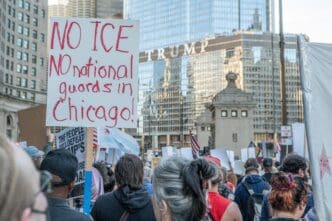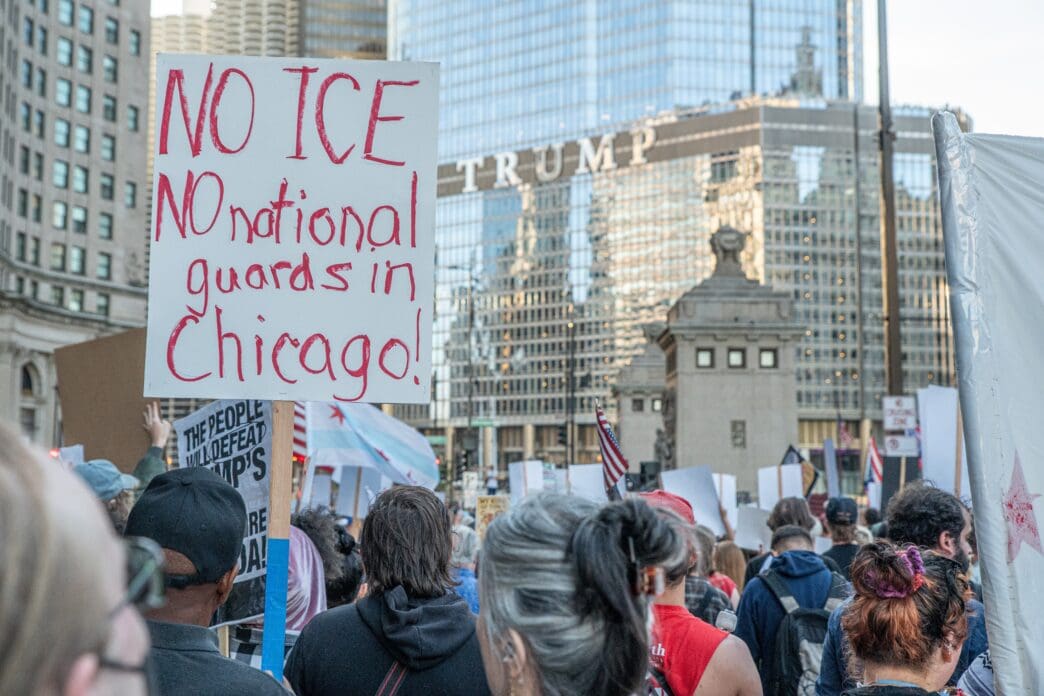Executive Summary
- Chicago has become a key battleground for the Trump administration’s immigration enforcement, marked by “Operation Midway Blitz” which led to over 1,000 migrant arrests, and ongoing clashes between federal agents and protesters.
- Judicial oversight of federal agents in Chicago has intensified, with a U.S. District Judge mandating body cameras for agents interacting with protesters and ordering an ICE Field Director to court.
- A federal appeals court upheld a lower court’s decision to deny the Trump administration’s effort to deploy federalized National Guard troops in Illinois to quell demonstrations.
The Story So Far
- Chicago has become a central battleground due to the Trump administration’s intensified immigration enforcement efforts, particularly through “Operation Midway Blitz,” which has led to over 1,000 migrant arrests in Illinois. This aggressive federal initiative has sparked widespread protests and confrontations between federal agents and demonstrators, consequently leading to increased judicial oversight, legal challenges against federal tactics, and denials of federalized National Guard deployment.
Why This Matters
- The intensified federal immigration enforcement under President Trump in Chicago is leading to escalating tensions and confrontations between federal agents and protesters, prompting significant judicial oversight, including mandates for body cameras and scrutiny of agent conduct, while also highlighting challenges to federal authority as courts push back against the deployment of federalized National Guard troops.
Who Thinks What?
- The Trump administration, through the Department of Homeland Security and ICE, views its “Operation Midway Blitz” as a necessary enforcement effort to arrest migrants and make Illinois safe, stating they will not be deterred by protests or violence.
- The judiciary, including U.S. District Judges Sara Ellis and April Perry and the Seventh Circuit Court of Appeals, is asserting oversight on federal operations, mandating body cameras for agents, questioning the deployment of tear gas, denying the federalization of National Guard troops due to lack of credible evidence of rebellion, and ensuring the preservation of evidence.
- Protesters and individuals like Marimar Martinez and her attorney are actively opposing ICE actions through demonstrations, disputing allegations of wrongdoing against them, and seeking accountability and transparency from federal agents, including through body camera footage and the preservation of evidence.
Chicago has emerged as the focal point of the Trump administration’s immigration enforcement efforts, marked by a series of legal battles and confrontations between federal agents and protesters. Recent developments, including a federal appeals court upholding a decision to deny the deployment of National Guard troops in Illinois and a judge mandating body cameras for federal agents, underscore the escalating tensions in the city. These events come as the region prepares for further anti-ICE demonstrations this weekend.
Operation Midway Blitz Intensifies
The city has been under national scrutiny following the deployment of federal agents for “Operation Midway Blitz,” an Immigration and Customs Enforcement (ICE) initiative. This operation has led to over 1,000 migrant arrests across Illinois between September 8 and October 3, according to the Department of Homeland Security (DHS). The ICE building in Broadview, outside Chicago, has become a frequent site of protests against these arrests.
DHS officials have stated that they “won’t let this violence deter us from arresting the worst of the worst and making Illinois safe again.” Tensions have flared, with images showing federal agents clashing with demonstrators and deploying tear gas during protests.
Judicial Oversight Increases
U.S. District Judge Sara Ellis has expressed “serious concerns” regarding compliance with her previous orders aimed at de-escalating confrontations. She has expanded her restraining order, now requiring all federal agents involved in the Chicago immigration crackdown to wear body cameras when interacting with protesters.
The Department of Justice opposed the body camera mandate, citing logistical challenges in recording and reviewing footage. Judge Ellis also ordered ICE Field Director Russell Hott to appear in court on Monday to address reports of tear gas deployment without warning.
Controversial Vehicle Relocation
In a separate development, a federal vehicle involved in an incident with American citizen Marimar Martinez was moved over 1,000 miles away to Maine. Martinez is accused of ramming the vehicle on October 4, an allegation her attorney disputes, suggesting body camera footage would show a federal agent swerving into her car.
Martinez’s attorney expressed concern that moving the vehicle, key evidence in the case, would compromise its integrity. The judge in the case ordered the vehicle to be returned via flatbed truck to preserve potential evidence.
ICE Arrests Local Police Officer
ICE agents arrested a police officer in the Chicago suburb of Hanover Park on Thursday, alleging he is an unlawful immigrant from Montenegro. DHS stated that officer Radule Bojovic overstayed a tourist visa that expired in 2015.
According to DHS Assistant Secretary Tricia McLaughlin, Bojovic was “encountered during a targeted enforcement action as part of Operation Midway Blitz.” McLaughlin questioned why a police department would employ an individual allegedly breaking immigration laws.
National Guard Deployment Denied
In a setback for the Trump administration, a federal appeals court upheld a lower court’s ruling denying the government’s effort to deploy National Guard troops under federal control in Illinois. While the troops can remain in the state, they cannot be federalized for the purpose of quelling demonstrations.
This decision from the Seventh Circuit Court of Appeals follows a scathing oral ruling by U.S. District Court Judge April Perry. Judge Perry had previously granted a temporary restraining order halting the deployment, stating she had “no credible evidence that there has been rebellion in the state of Illinois” to justify such federalization.
Concluding Developments
The flurry of legal rulings, arrests, and ongoing protests in Chicago underscore the intense and complex nature of federal immigration enforcement under President Trump. With judicial oversight tightening and public confrontations continuing, the city remains a critical arena for the broader debate on immigration policy and the actions of federal agencies.








